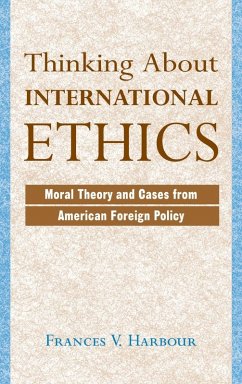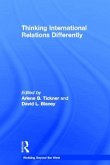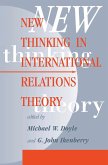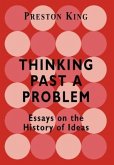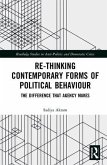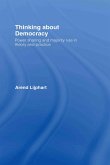Frances V Harbour
Thinking About International Ethics
Moral Theory And Cases From American Foreign Policy
Frances V Harbour
Thinking About International Ethics
Moral Theory And Cases From American Foreign Policy
- Gebundenes Buch
- Merkliste
- Auf die Merkliste
- Bewerten Bewerten
- Teilen
- Produkt teilen
- Produkterinnerung
- Produkterinnerung
This book describes and analyzes important moral theories as they pertain to international politics and the study of international relations, examining the role that moral thinking actually played in specific cases in American foreign policy.
Andere Kunden interessierten sich auch für
![Thinking International Relations Differently Thinking International Relations Differently]() Thinking International Relations Differently239,99 €
Thinking International Relations Differently239,99 €![New Thinking In International Relations Theory New Thinking In International Relations Theory]() Michael W DoyleNew Thinking In International Relations Theory205,99 €
Michael W DoyleNew Thinking In International Relations Theory205,99 €![Thinking about Global Governance Thinking about Global Governance]() Thomas G. WeissThinking about Global Governance227,99 €
Thomas G. WeissThinking about Global Governance227,99 €![Thinking Past a Problem Thinking Past a Problem]() Preston KingThinking Past a Problem217,99 €
Preston KingThinking Past a Problem217,99 €![Thinking on Housing Thinking on Housing]() Peter KingThinking on Housing33,99 €
Peter KingThinking on Housing33,99 €![Re-thinking Contemporary Political Behaviour Re-thinking Contemporary Political Behaviour]() Sadiya AkramRe-thinking Contemporary Political Behaviour204,99 €
Sadiya AkramRe-thinking Contemporary Political Behaviour204,99 €![Thinking about Democracy Thinking about Democracy]() Arend LijphartThinking about Democracy216,99 €
Arend LijphartThinking about Democracy216,99 €-
-
-
This book describes and analyzes important moral theories as they pertain to international politics and the study of international relations, examining the role that moral thinking actually played in specific cases in American foreign policy.
Hinweis: Dieser Artikel kann nur an eine deutsche Lieferadresse ausgeliefert werden.
Hinweis: Dieser Artikel kann nur an eine deutsche Lieferadresse ausgeliefert werden.
Produktdetails
- Produktdetails
- Verlag: Routledge
- Seitenzahl: 226
- Erscheinungstermin: 13. September 2019
- Englisch
- Abmessung: 235mm x 157mm x 17mm
- Gewicht: 485g
- ISBN-13: 9780367319113
- ISBN-10: 036731911X
- Artikelnr.: 58069456
- Herstellerkennzeichnung
- Libri GmbH
- Europaallee 1
- 36244 Bad Hersfeld
- gpsr@libri.de
- Verlag: Routledge
- Seitenzahl: 226
- Erscheinungstermin: 13. September 2019
- Englisch
- Abmessung: 235mm x 157mm x 17mm
- Gewicht: 485g
- ISBN-13: 9780367319113
- ISBN-10: 036731911X
- Artikelnr.: 58069456
- Herstellerkennzeichnung
- Libri GmbH
- Europaallee 1
- 36244 Bad Hersfeld
- gpsr@libri.de
Frances V. Harbour is assistant professor of government at George Mason University. She is a founding member and past president of the International Ethics Section of the International Studies Association and a former Social Science Research Council/John D. and Catherine T. MacArthurfellow in international peace and security studies.
Acknowledgments
Introduction: Ethics
International Affairs
and American Foreign Policy
A Philosophical Map
Examining Cases Through Multiple Lenses
The Plan of This Book
Some Caveats
Notes
For Further Reading
Part I What Role for Ethics in Foreign Policy?
Realism Versus Idealism in the Twentieth Century
Postwar Paradigm Shift or an Interwar Debate?
Order in an Anarchic World
Shades of Realism
Idealism in Exile
Normative Analysis Reemerges
The Study of International Ethics Since the Fall of the Berlin Wall
Notes
For Further Reading
A Closer Look at Realism in the Twentieth Century
Critique of Moralism
Not Morality
The Realist Moral Vision
Neorealism in the Late Twentieth Century
Notes
For Further Reading
Realists
Idealists
and the Politics of Ratifying Chemical Arms Control Treaties in the United States
1926-1997
Failed Ratification: 1926
Ratifying the Geneva Protocol of 1925: 1969-1975
The Battle for the Chemical Weapons Convention of 1993
Realism
Idealism
and Chemical Arms Control
Notes
For Further Reading
Part II Ethics
Intentions
and Consequences in Making Foreign Policy
The Bombing of Hiroshima and Nagasaki in August 1945: Events and Moral Questions
Atomic Decisionmaking in World War II: A Summary of Events
Was the Atomic Bombing Necessary to End the War?
Notes
For Further Reading
Consequentialism: Ends Justify the Means
Whose Ends? The State Versus the World
Utilitarians: Cosmopolitan and Consequentialist
Notes
For Further Reading
Consequentialist Evaluations of the U.S. Decision to Use Atomic Bombs in Hiroshima and Nagasaki
Judging the Decision: A Realist Perspective
The Decision to Use Atomic Bombs on Hiroshima and Nagasaki: An Act Utilitarian Perspective
How Should an Act Utilitarian Have Made the Decision?
A Dangerous Precedent?
Notes
For Further Reading
Deontological Approaches to International Ethics: Motives
Duties
Rules
and Means
Kant's Moral Theory
Natural Law and the Just War Tradition
Notes
For Further Reading
The Hiroshima Decision and the Just War Tradition
Discrimination
Proportionality
and Double Effect: A Summary
Intended Targets: Groves and the Committees
The President's Position
Stimson: Kyoto
Hiroshima
and Noncombatant Immunity
Intentions of the United States?
Protecting Noncombatants or Innocents?
Notes
For Further Reading
Part Ill Human Rights
Cultural Relativism
and National Duties
The United States
China
and Most Favored Nation Trade Status
Chinese Human Rights Policy in the 1990s
The Politics of MFN Trade Status in the United States
Notes
For Further Reading
The Politics of Most Favored Nation Trade Status for China and the Basis of Rights
China and Cultural Relativism
The Basis of Human Rights: Disagreement at the Heart
Cultural Relativism and MFN Trade Status for China
Human Rights Policy Consistent with Tradition and Culture
Notes
For Further Reading
Moral Theories and the Debate in the U.S. Government on Most Favored Nation Trade Status for China
Moral Theories and Human Rights Policy: A First Cut
Human Rights
International Duties
and Effective Action
The Presidents as Quasi Utilitarians
The Congressional Cauldron
MFN Trade Status for China: Moral Theories and Moral Arguments
Notes
For Further Reading
Conclusion: Moral Theory as a Tool for Analyzing and Evaluating Foreign Policy
Analysis: What Role Do Moral Frameworks Play in Political Decisionmaking?
Advantages and Disadvantages of Realism as a Tool for Evaluating American Foreign Policy Decisions
Advantages and Disadvantages of Utilitarian Thinking as a Tool for Evaluating American Foreign Policy Decisions
Advantages and Disadvantages of Deontological Approaches as Tools for Evaluating American Foreign Policy Decisions
Index
Introduction: Ethics
International Affairs
and American Foreign Policy
A Philosophical Map
Examining Cases Through Multiple Lenses
The Plan of This Book
Some Caveats
Notes
For Further Reading
Part I What Role for Ethics in Foreign Policy?
Realism Versus Idealism in the Twentieth Century
Postwar Paradigm Shift or an Interwar Debate?
Order in an Anarchic World
Shades of Realism
Idealism in Exile
Normative Analysis Reemerges
The Study of International Ethics Since the Fall of the Berlin Wall
Notes
For Further Reading
A Closer Look at Realism in the Twentieth Century
Critique of Moralism
Not Morality
The Realist Moral Vision
Neorealism in the Late Twentieth Century
Notes
For Further Reading
Realists
Idealists
and the Politics of Ratifying Chemical Arms Control Treaties in the United States
1926-1997
Failed Ratification: 1926
Ratifying the Geneva Protocol of 1925: 1969-1975
The Battle for the Chemical Weapons Convention of 1993
Realism
Idealism
and Chemical Arms Control
Notes
For Further Reading
Part II Ethics
Intentions
and Consequences in Making Foreign Policy
The Bombing of Hiroshima and Nagasaki in August 1945: Events and Moral Questions
Atomic Decisionmaking in World War II: A Summary of Events
Was the Atomic Bombing Necessary to End the War?
Notes
For Further Reading
Consequentialism: Ends Justify the Means
Whose Ends? The State Versus the World
Utilitarians: Cosmopolitan and Consequentialist
Notes
For Further Reading
Consequentialist Evaluations of the U.S. Decision to Use Atomic Bombs in Hiroshima and Nagasaki
Judging the Decision: A Realist Perspective
The Decision to Use Atomic Bombs on Hiroshima and Nagasaki: An Act Utilitarian Perspective
How Should an Act Utilitarian Have Made the Decision?
A Dangerous Precedent?
Notes
For Further Reading
Deontological Approaches to International Ethics: Motives
Duties
Rules
and Means
Kant's Moral Theory
Natural Law and the Just War Tradition
Notes
For Further Reading
The Hiroshima Decision and the Just War Tradition
Discrimination
Proportionality
and Double Effect: A Summary
Intended Targets: Groves and the Committees
The President's Position
Stimson: Kyoto
Hiroshima
and Noncombatant Immunity
Intentions of the United States?
Protecting Noncombatants or Innocents?
Notes
For Further Reading
Part Ill Human Rights
Cultural Relativism
and National Duties
The United States
China
and Most Favored Nation Trade Status
Chinese Human Rights Policy in the 1990s
The Politics of MFN Trade Status in the United States
Notes
For Further Reading
The Politics of Most Favored Nation Trade Status for China and the Basis of Rights
China and Cultural Relativism
The Basis of Human Rights: Disagreement at the Heart
Cultural Relativism and MFN Trade Status for China
Human Rights Policy Consistent with Tradition and Culture
Notes
For Further Reading
Moral Theories and the Debate in the U.S. Government on Most Favored Nation Trade Status for China
Moral Theories and Human Rights Policy: A First Cut
Human Rights
International Duties
and Effective Action
The Presidents as Quasi Utilitarians
The Congressional Cauldron
MFN Trade Status for China: Moral Theories and Moral Arguments
Notes
For Further Reading
Conclusion: Moral Theory as a Tool for Analyzing and Evaluating Foreign Policy
Analysis: What Role Do Moral Frameworks Play in Political Decisionmaking?
Advantages and Disadvantages of Realism as a Tool for Evaluating American Foreign Policy Decisions
Advantages and Disadvantages of Utilitarian Thinking as a Tool for Evaluating American Foreign Policy Decisions
Advantages and Disadvantages of Deontological Approaches as Tools for Evaluating American Foreign Policy Decisions
Index
Acknowledgments
Introduction: Ethics
International Affairs
and American Foreign Policy
A Philosophical Map
Examining Cases Through Multiple Lenses
The Plan of This Book
Some Caveats
Notes
For Further Reading
Part I What Role for Ethics in Foreign Policy?
Realism Versus Idealism in the Twentieth Century
Postwar Paradigm Shift or an Interwar Debate?
Order in an Anarchic World
Shades of Realism
Idealism in Exile
Normative Analysis Reemerges
The Study of International Ethics Since the Fall of the Berlin Wall
Notes
For Further Reading
A Closer Look at Realism in the Twentieth Century
Critique of Moralism
Not Morality
The Realist Moral Vision
Neorealism in the Late Twentieth Century
Notes
For Further Reading
Realists
Idealists
and the Politics of Ratifying Chemical Arms Control Treaties in the United States
1926-1997
Failed Ratification: 1926
Ratifying the Geneva Protocol of 1925: 1969-1975
The Battle for the Chemical Weapons Convention of 1993
Realism
Idealism
and Chemical Arms Control
Notes
For Further Reading
Part II Ethics
Intentions
and Consequences in Making Foreign Policy
The Bombing of Hiroshima and Nagasaki in August 1945: Events and Moral Questions
Atomic Decisionmaking in World War II: A Summary of Events
Was the Atomic Bombing Necessary to End the War?
Notes
For Further Reading
Consequentialism: Ends Justify the Means
Whose Ends? The State Versus the World
Utilitarians: Cosmopolitan and Consequentialist
Notes
For Further Reading
Consequentialist Evaluations of the U.S. Decision to Use Atomic Bombs in Hiroshima and Nagasaki
Judging the Decision: A Realist Perspective
The Decision to Use Atomic Bombs on Hiroshima and Nagasaki: An Act Utilitarian Perspective
How Should an Act Utilitarian Have Made the Decision?
A Dangerous Precedent?
Notes
For Further Reading
Deontological Approaches to International Ethics: Motives
Duties
Rules
and Means
Kant's Moral Theory
Natural Law and the Just War Tradition
Notes
For Further Reading
The Hiroshima Decision and the Just War Tradition
Discrimination
Proportionality
and Double Effect: A Summary
Intended Targets: Groves and the Committees
The President's Position
Stimson: Kyoto
Hiroshima
and Noncombatant Immunity
Intentions of the United States?
Protecting Noncombatants or Innocents?
Notes
For Further Reading
Part Ill Human Rights
Cultural Relativism
and National Duties
The United States
China
and Most Favored Nation Trade Status
Chinese Human Rights Policy in the 1990s
The Politics of MFN Trade Status in the United States
Notes
For Further Reading
The Politics of Most Favored Nation Trade Status for China and the Basis of Rights
China and Cultural Relativism
The Basis of Human Rights: Disagreement at the Heart
Cultural Relativism and MFN Trade Status for China
Human Rights Policy Consistent with Tradition and Culture
Notes
For Further Reading
Moral Theories and the Debate in the U.S. Government on Most Favored Nation Trade Status for China
Moral Theories and Human Rights Policy: A First Cut
Human Rights
International Duties
and Effective Action
The Presidents as Quasi Utilitarians
The Congressional Cauldron
MFN Trade Status for China: Moral Theories and Moral Arguments
Notes
For Further Reading
Conclusion: Moral Theory as a Tool for Analyzing and Evaluating Foreign Policy
Analysis: What Role Do Moral Frameworks Play in Political Decisionmaking?
Advantages and Disadvantages of Realism as a Tool for Evaluating American Foreign Policy Decisions
Advantages and Disadvantages of Utilitarian Thinking as a Tool for Evaluating American Foreign Policy Decisions
Advantages and Disadvantages of Deontological Approaches as Tools for Evaluating American Foreign Policy Decisions
Index
Introduction: Ethics
International Affairs
and American Foreign Policy
A Philosophical Map
Examining Cases Through Multiple Lenses
The Plan of This Book
Some Caveats
Notes
For Further Reading
Part I What Role for Ethics in Foreign Policy?
Realism Versus Idealism in the Twentieth Century
Postwar Paradigm Shift or an Interwar Debate?
Order in an Anarchic World
Shades of Realism
Idealism in Exile
Normative Analysis Reemerges
The Study of International Ethics Since the Fall of the Berlin Wall
Notes
For Further Reading
A Closer Look at Realism in the Twentieth Century
Critique of Moralism
Not Morality
The Realist Moral Vision
Neorealism in the Late Twentieth Century
Notes
For Further Reading
Realists
Idealists
and the Politics of Ratifying Chemical Arms Control Treaties in the United States
1926-1997
Failed Ratification: 1926
Ratifying the Geneva Protocol of 1925: 1969-1975
The Battle for the Chemical Weapons Convention of 1993
Realism
Idealism
and Chemical Arms Control
Notes
For Further Reading
Part II Ethics
Intentions
and Consequences in Making Foreign Policy
The Bombing of Hiroshima and Nagasaki in August 1945: Events and Moral Questions
Atomic Decisionmaking in World War II: A Summary of Events
Was the Atomic Bombing Necessary to End the War?
Notes
For Further Reading
Consequentialism: Ends Justify the Means
Whose Ends? The State Versus the World
Utilitarians: Cosmopolitan and Consequentialist
Notes
For Further Reading
Consequentialist Evaluations of the U.S. Decision to Use Atomic Bombs in Hiroshima and Nagasaki
Judging the Decision: A Realist Perspective
The Decision to Use Atomic Bombs on Hiroshima and Nagasaki: An Act Utilitarian Perspective
How Should an Act Utilitarian Have Made the Decision?
A Dangerous Precedent?
Notes
For Further Reading
Deontological Approaches to International Ethics: Motives
Duties
Rules
and Means
Kant's Moral Theory
Natural Law and the Just War Tradition
Notes
For Further Reading
The Hiroshima Decision and the Just War Tradition
Discrimination
Proportionality
and Double Effect: A Summary
Intended Targets: Groves and the Committees
The President's Position
Stimson: Kyoto
Hiroshima
and Noncombatant Immunity
Intentions of the United States?
Protecting Noncombatants or Innocents?
Notes
For Further Reading
Part Ill Human Rights
Cultural Relativism
and National Duties
The United States
China
and Most Favored Nation Trade Status
Chinese Human Rights Policy in the 1990s
The Politics of MFN Trade Status in the United States
Notes
For Further Reading
The Politics of Most Favored Nation Trade Status for China and the Basis of Rights
China and Cultural Relativism
The Basis of Human Rights: Disagreement at the Heart
Cultural Relativism and MFN Trade Status for China
Human Rights Policy Consistent with Tradition and Culture
Notes
For Further Reading
Moral Theories and the Debate in the U.S. Government on Most Favored Nation Trade Status for China
Moral Theories and Human Rights Policy: A First Cut
Human Rights
International Duties
and Effective Action
The Presidents as Quasi Utilitarians
The Congressional Cauldron
MFN Trade Status for China: Moral Theories and Moral Arguments
Notes
For Further Reading
Conclusion: Moral Theory as a Tool for Analyzing and Evaluating Foreign Policy
Analysis: What Role Do Moral Frameworks Play in Political Decisionmaking?
Advantages and Disadvantages of Realism as a Tool for Evaluating American Foreign Policy Decisions
Advantages and Disadvantages of Utilitarian Thinking as a Tool for Evaluating American Foreign Policy Decisions
Advantages and Disadvantages of Deontological Approaches as Tools for Evaluating American Foreign Policy Decisions
Index

